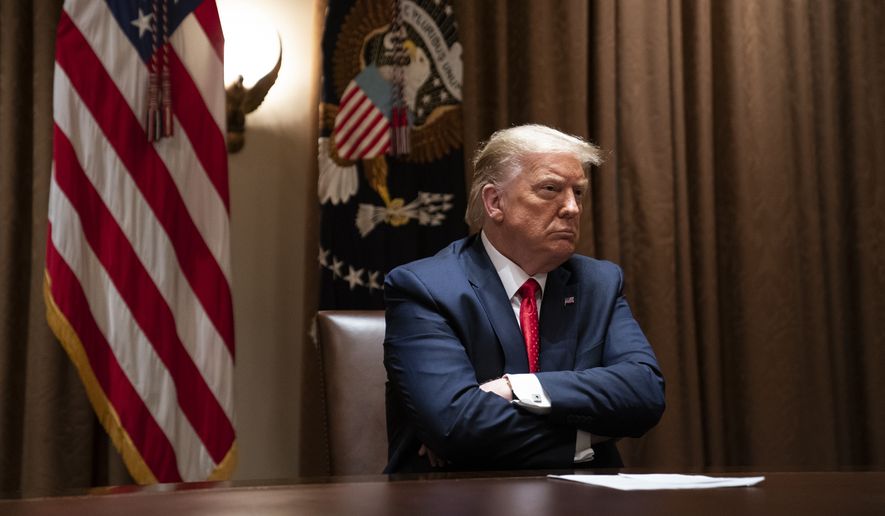Harvard beat President Trump on Tuesday, with the administration retreating on plans to make foreign students have to attend at least one class in person this fall or else risk losing their visas and facing deportation.
U.S. Immigration and Customs Enforcement had announced the new policy last week, saying if schools move to online classes amid coronavirus, there’s no need for their foreign students to be here, since they can take the courses anywhere in the world.
But amid massive outrage and a lawsuit led by Harvard, the government caved, telling a federal judge Tuesday that it was revoking the new policy.
The Justice Department lawyer didn’t say why it canceled the policy, but Judge Allison D. Burroughs praised both sides for reaching a deal.
“The government has agreed to rescind the July 6, 2020, policy directive, and the Frequently Asked Questions, the FAQs, that were released the next day,” she said in a virtual hearing. “They’ve also agreed to rescind any implementation of the directive. They will return to the status quo.”
It was a rare retreat on immigration for the Trump administration, which has suffered its share of defeats in the courts, but doesn’t often cave to public pressure.
ICE didn’t immediately respond to an inquiry on the decision, and the government’s lawyer didn’t offer an explanation during the hearing with Judge Burroughs.
Those who’d battled the new policy took a victory lap over the retreat.
“Enough is enough. It’s time for the president to stop treating immigrants like nothing more than scapegoats and for him to start leading our nation through this national pandemic,” said New York Attorney General Letitia James, who’d joined a lawsuit by Democratic-led states.
But Marguerite Telford, communications director at the Center for Immigration Studies, said the walk-back exposed a rift inside the White House between pro-business factions who want cheap labor, and immigration-crackdown supporters.
The pro-business side triumphed, she said.
“Why would a foreign student need to come here if all they are doing is coming here to take a class online?” Ms. Telford said.
Under normal rules, foreign students must take at least some in-person classes. Those rules were strengthened after the Sept. 11 terrorist attacks, which saw one of the al-Qaeda hijackers come on a valid student visa but never show up at school. He would later pilot the plane that struck the Pentagon.
When the coronavirus pandemic struck, ICE, which runs the Student and Exchange Visitor Program, announced a waiver, saying students could stay on valid visas even if all of their coursework was online.
With the fall semester looming, though, ICE issued an update last week saying that foreign students needed to take at least one in-person class in order to have a valid visa. That’s still more lenient than the original policy, though it’s more restrictive than the policy in place this spring.
ICE said students could transfer from online-only schools to ones that offered in-person classes, and keep a valid visa.
The new rules applied both to students already here, and to students planning to arrive for the fall semester, who would have had their entry blocked by border officers.
Colleges and universities, facing the loss of billions of dollars, and arguing hardship for themselves and the affected students, protested the new policy.
Harvard led one lawsuit, joined by the Massachusetts Institute of Technology. A number of Democrat-led states from New York to California also sued.
Harvard President Lawrence Bacow pointed out that Judge Burroughs is keeping jurisdiction over the case so the school can quickly renew its demands should ICE re-start the policy again.
“This is a significant victory,” he said in a message to the Harvard community. “The ICE directive sought to force each of us to choose between the health of our communities and the education of our international students — a false and dangerous choice which we rejected.”
Harvard has adopted an online class model for the coming school year. MIT is using a “hybrid” model with only some in-person classes.
There are 1.1 million people on foreign student visas in the U.S. — but most of those wouldn’t have been affected by the policy, according to the Center for Immigration Studies.
More than 200,000 of those visa holders are actually here on extended internship and would be exempt. Most of the others are likely attending schools that do plan at least some in-person classes, CIS said.
The organization calculated that perhaps just 70,000 students may have been affected.
• Stephen Dinan can be reached at sdinan@washingtontimes.com.




Please read our comment policy before commenting.